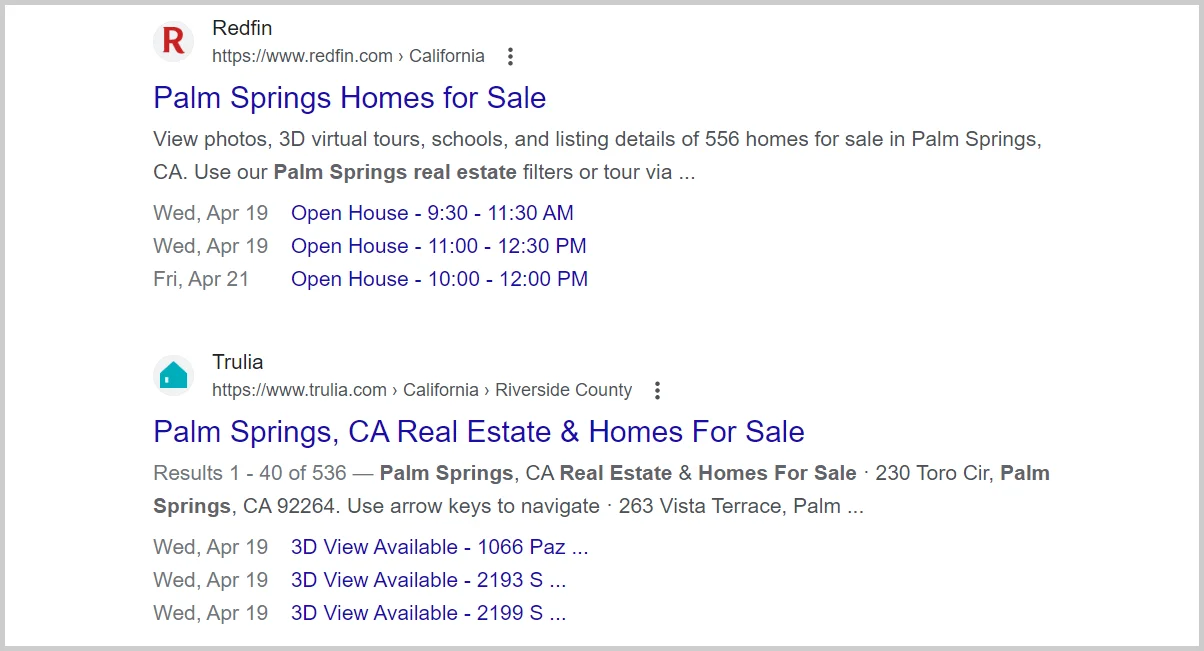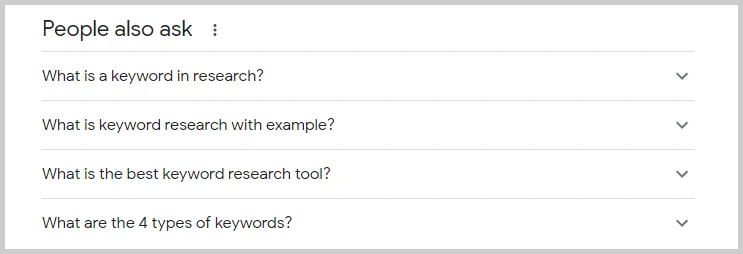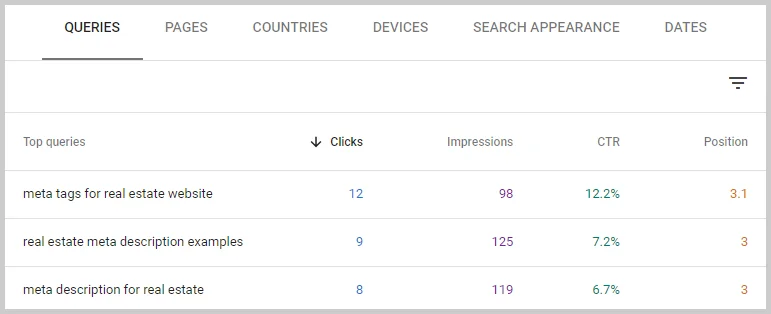The Importance of Keyword Research For Real Estate SEO
Keywords For Real Estate
It’s time to dig into the topic keyword research for real estate SEO and how it can help you optimize your content, target user intent, and discover new content ideas.
We'll also share some practical methods for finding real estate keywords for your marketing strategy. Click here to jump to instructions for researching keywords.
Otherwise, let’s get started with some SEO and keyword theory…

What are keywords?
Keywords are the words or phrases that people enter into search engines like Google or Bing when they want to find something online.
 Over 8.5 billion searches are made on Google everyday, all using keywords (source).
Over 8.5 billion searches are made on Google everyday, all using keywords (source).
Why are keywords important?
Keywords are the language through which users communicate with search engines, and conversely, they are what search engines use to understand what a user is looking for (their search intent).
The third point of the triangle is the SEO, webmaster, or content creator, who uses an understanding of keywords to communicate with both users and search engines in order to ensure that their website or content appears as a relevant result when a user types in a related query.
Keywords are the link in the chain between user intent, google understanding that intent, and what a website is offering.
How To Do Keyword Analysis
Not all keywords are created equal. Keywords can have many different properties depending on how they’re used and how they relate to both user intent and specific online content.
Here are some factors you need to know in order to accurately understand and assess real estate keywords for SEO:
- Search volume - This refers to the frequency with which a keyword is used. High volume keywords tend to be short and fairly generic, like “real estate”.
- Relevance - Is the keyword relevant to a specific piece of content? It’s no good ranking for a keyword that does not reflect any intent related to your business or its services.
- Competition - A keyword is competitive if many other sites are working to rank for that keyword as well. Usually, such keywords are competitive for a reason, but there are diminishing returns once there are too many established sites that rank for them already.
In real estate, highly competitive terms tend to have a few characteristics in common:
- They are linked to large real estate markets or areas, such as “California” or “Austin TX”
- They have very large search volumes
- They are combined with simple real estate terms like “listings” or “homes for sale”
- The first pages of search results for these terms are dominated by large portals like Zillow, Trulia or Redfin
 For keywords like "palm springs homes for sale", smaller sites have almost no chance of competing on the first page of results.
For keywords like "palm springs homes for sale", smaller sites have almost no chance of competing on the first page of results.
Long Tail vs Short Tail Keywords
Understanding the difference between long and short-tail keywords is a great way to see how the above factors come together (or apart).
- Short-tail keywords are broad search terms that consist of only a few words. For example: “Texas homes”
- Long-tail keywords are longer and more specific. For example: “Windsor Park pool homes for sale”
In real estate, it’s usually better to target long-tail keywords for a number of reasons:
- They are less competitive and so easier to rank for
- They represent a more motivated and focused user intent (and therefore are more likely to convert into solid leads)
- They can better match your specific business focus
Also, while short-tail keywords tend to have the highest search volumes individually, long-tail keywords actually make up the bulk of total online searches.
 The "People Also Ask" section of Google search results is a great source for long-tail keyword ideas
The "People Also Ask" section of Google search results is a great source for long-tail keyword ideas
Negative Keywords
Language and intent are ambiguous, so it’s often the case that your site may show for search queries that are irrelevant. It’s important to understand what these are so you can better understand your keyword data.
To illustrate, here are some common examples of potentially irrelevant negative keywords in real estate:
- “[Area] for sale” - While these searches may include an interest in real estate, they're also performed by people looking for second-hand goods
- “For sale by owner” - This keyword at least conveys some intent to buy, but since it suggests the person isn't looking for your services, it could be avoided
- “[Area] houses” - While this could be a worthwhile keyword to target, it would also include a larger number of "window shoppers"
- “Tiny” - Most agents are not interested in tiny homes
- “Halfway” - If you're targeting the keyword "houses in [area]", you don't also want to get impressions for "halfway houses in [area]"

Like with real estate keywords in general, what counts as a negative keyword could be very specific to your area or business.
Understanding Search Intent
We’ve mentioned a few times that keywords are a way of understanding and communicating intent.
For example, someone searching for “contemporary houses” may just want to browse the latest architectural trends and isn’t on the market for a new home.
On the other hand, someone looking for “Newly listed condos in Surrey for under $500K” practically has their wallet out, so to speak.
Search intent is usually divided into three broad categories:
- Informational - Reflects a desire to find information, browse, or just see what’s out there.
- Navigational - Looking for a specific page or website. This would include someone searching your business name.
- Commercial - Looking for a specific product or service, or place to provide it
Many real estate keywords are commercial in some way. For example, a person searching for “Nanaimo homes for sale” is very likely to have at least some intent or desire to purchase a home.
Targeting search queries with informational intent may not directly bring you leads, but they could help to establish brand awareness and your name as a trusted expert on a given area.
Informational keywords are great to target in blog posts, resource pages, or less formal venues like forums.
How To Do Keyword Research
Okay - finally it’s time to get down to the business of actually finding what keywords to optimize your content for.
So here are a few methods for finding real estate keywords to target in your marketing strategy…
Understanding Your Business
The most important place to start with researching keywords is your understanding of your own business. Afterall, you want to attract potential clients who are interested in what you have to offer, and you know what you have to offer.
When thinking about what your business does, it’s important to be specific. You may say that your business is “real estate”, but that’s far too general to be useful as the basis for an SEO and content marketing strategy.
However, if your business specializes in “selling mid-market private golfing community homes in Palm Desert California to out-of-town buyers”, then you have something specific enough to work with.
The next step is figuring out what potential buyers are entering into search engines that could potentially connect with your business. It might be something general like “golf homes california” or more specific like “private golf homes for sale coachella valley under 500K”.
Here you can simply try to adopt the mindset of the average internet user (not always as easy as it sounds), ask your clients, or do some research, which brings us to…
Real Estate Keyword Research Tools
There are many specialized and paid tools for conducting keywords research, from Google Ads’ Keyword Explorer, to Semrush, Ahrefs, and even ChatGPT.
But if you want to get started right away, then look no further than Google itself, which provides some of the most accessible and effective (and free) tools keyword research.
Here’s how to get started...
- Google Search Auto-Complete: As you start typing your target keyword in the Google search bar, take note of the auto-complete suggestions that appear. These suggestions can provide insights into what people are actively searching for, and can help you identify related keywords and search queries that are relevant to your content.
 Auto-complete results can vary based on your search history. Use incognito mode for more consistent suggestions.
Auto-complete results can vary based on your search history. Use incognito mode for more consistent suggestions.
- "People Also Ask" Questions: Pay attention to the "People also ask" section that appears in Google search results when you perform a search. These questions can give you valuable insights into related queries and user intent. Consider incorporating the questions and answers to these questions in your own content. These represent a great opportunity to show up on the front-page for otherwise oversaturated search terms.
- "Related Searches": Scroll to the bottom of the search results page to find the "Related searches" section. This section can provide you with additional keyword ideas related to your “seed” keyword. They’re a safe bet because Google already thinks they have a high-enough relevance to include on the search page. Plus, because they’re more specific, they’re less competitive.
- Google Search Console: Google Search Console is a valuable tool for keyword research as it provides insights on the actual search queries that are driving traffic to your website.
 The results above indicate that providing examples of meta descriptions would give users what they're looking for.
The results above indicate that providing examples of meta descriptions would give users what they're looking for.
Using Search Console for keyword research:
- Access Google Search Console and go to the "Performance - Search Results" report.
- Review the search query data to identify relevant keywords driving traffic to your website.
- Break results down by keywords containing specific words or phrases, or by page. Click on "+ New" and select either "Query..." or "Page...". For example, entering "/blog/" in the Page window might give you the keyword performance for all your blog posts.
- Analyze clicks, impressions, and average position to identify opportunities. For example, a keyword with high impressions but low CTR could be due to associated pages having poorly optimized titles or meta descriptions. Or, a keyword with an average search position of 11 could be an opportunity to get to the front page (sub 10 position) with just a little work.
- Optimize content, meta tags, and other SEO elements to better target keyword opportunities (see below).
- Monitor performance over time and adjust your keyword strategy as needed based on changes in data and search trends. Keep an eye out for new keywords that are getting activity. These could form the basis of new content to target them in a more focused way.
So You Have Your Keywords. Now What?
How to optimize your content with keywords in mind.
- Include keywords in on-page elements. Incorporate keywords into headlines and the opening lines of paragraphs in a natural way that’s relevant to the content, keeping it clear and concise.
- Include your real estate keywords in page meta-descriptions. If the keywords in your meta descriptions match the keywords used in a search query, they will appear in bold, making them stand out on search result pages.
- Use keywords to inform your site structure. More general keywords should correspond to your upper-level pages, like the homepage, while more specific long-tail keywords should be targeted by sub-pages. For example, blogs or forum posts are great for addressing very specific questions or niche topics that support your core business focus.
- Use relevant keywords to link between pages. For example: “For more real estate information, click here” vs “Learn more about Austin real estate listings.”
Consider this example. Two options for the opening headline and text for the same page:
- “Make Your Dreams Come True! - In times gone by it has often been the case from time to time that those in search of a place to rest their head will …”
- “Find Your Dream Vancouver Home - If you’re looking for homes for sale in Vancouver, then you’re in the right place because…”
The second more optimized because it immediately conveys - to both users and search engines - exactly what the page is about. This improves both user engagement and the ranking potential of the content.
Why are keywords still important in 2023?
When asked what the most important factor for ranking a website is, Google will often say that it’s good content.
But, if all you have to do is create helpful, original, authoritative content, then why are keywords important? Here are a few reasons:
- Communication - Strategic use of keywords can improve engagement and conversion. For example, including the keyword that matches a user's intent or search query communicates to them that they’re in the right place and that you have what they’re looking for.
- Better Indexing - Google wants to serve relevant content to users, but first it needs to understand what a given piece of content is about. Clear use of keywords helps search engines understand the relevance of your content to specific search queries, which can improve your website's chances of ranking higher in SERPs for those keywords.
- New Ideas - Doing keyword research can reveal new opportunities and niches for content that you haven’t thought of yet. Keyword research could even reveal new business opportunities, as they give insight into what people are looking for.
So, while creating good content is important, keyword research is still a critical aspect of SEO for optimizing content, targeting user intent, and discovering new content ideas.
Keyword Research FAQ
What makes keyword SEO for real estate different?
Real estate SEO requires a unique approach due to the industry's highly localized nature, with keywords usually focusing on specific neighborhoods, cities, and regions. High-volume real estate keywords also tend to be relatively transactional in their intent, and so are highly competitive.
What are the best keywords for real estate?
There is no universal list of "best" real estate keywords. The effectiveness of keywords for real estate SEO depends on various factors, including your specific location, target audience, and the goals of your real estate website. Different keywords may perform differently in different markets and contexts.
Instead of looking for a one-size-fits-all list of "best" real estate keywords, it's important to conduct thorough keyword research, taking into account all of the factors mentioned above.
What are the most searched keywords for real estate?
The most searched keywords for real estate vary depending on location, but popular ones include "homes for sale," "real estate agents," "property listings," and "houses for rent."
What are meta keywords for real estate?
Meta keywords are a type of meta tag that used to be included in the HTML code of a webpage. Meta keywords are no longer used as a ranking factor by search engines. Focus on optimizing title tags, meta descriptions, and content with relevant keywords for real estate SEO.
What are the best keyword tools for real estate?
Some popular keyword tools for real estate include Google Keyword Planner, SEMrush, and Moz Keyword Explorer. These tools provide insights on search volume, competition, and keyword ideas to help with real estate keyword research and optimization.
